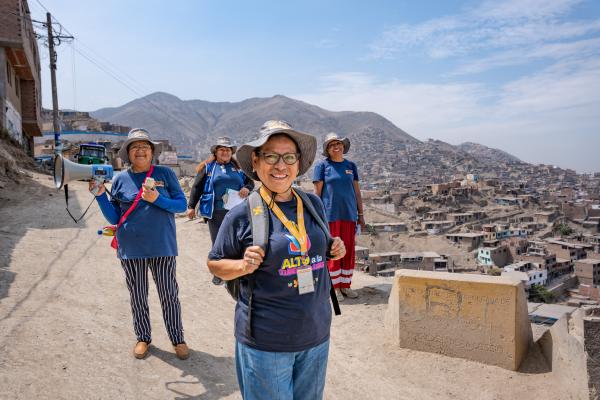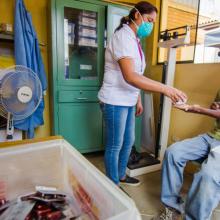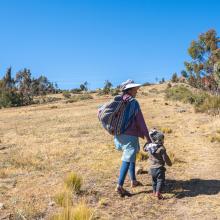To summarize in a few words the impact of Socios En Salud on the most vulnerable communities over the last year is no easy task. From research capable of scaling into public policy to interventions that provide accompaniment and ensure the well-being of our beneficiaries, our work is difficult to quantify, but not impossible.
Thus, below we share high-impact data corresponding to the period July 2022 through June 2023, which reflect the commitment that our health programs, guided by our theory of change and hand in hand with our community care model, have to bringing the cure against injustice to the most vulnerable communities.
Maternal, Child and Adolescent Health Program
In the last fiscal year, the Maternal, Child and Adolescent Health (SAMIA) Program of Socios En Salud put its focus on the adolescent population in the face of a worrying context, such as a 15% increase in new cases of HIV in the last ten years, an increase in the suicide rate between 2017 and 2021, and a rise in tuberculosis infections.
Therefore, a baseline study was conducted between January and June 2023 to identify the barriers to access to health care for adolescents. It found that only 30% of those surveyed have access to sex education, 22% have symptoms of depression and anxiety, and 12% have health insurance.
On the other hand, CASITA, the community intervention in child development, expanded to two districts of Cusco (Maras and Capacmarca), and achieved, for the first time in its history, that one of the 75 children aged 6 to 24 months with a risk or delay in their development is referred to a specialized medical center to receive speech therapy.
SAMIA also achieved that 71% of children improved their health condition (psychomotor development and anemia) at the end of the intervention, and 72% of dyads (caregiver-child) received four or more virtual or face-to-face educational sessions on early childhood development and anemia.
In terms of maternal, pregnant and puerperal health, the program attended 127 births, provided psychoprophylaxis sessions to 76 pregnant women and, thanks to its treatment management, achieved that 89% of newborns arrive in this world with an adequate weight until the end of their gestational age.
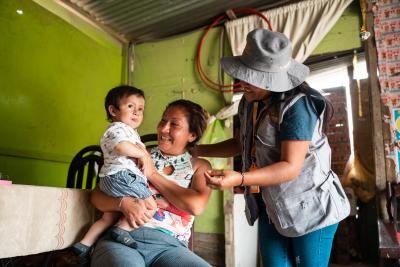
El Programa SAMIA apostó por asegurar una maternidad segura y responsable a favor del bienestar de la primera infancia y la adolescencia.
Mental Health Program
A milestone of the Programa Salud Mental (SAME) in the aforementioned period is definitely that 95% of people living with schizophrenia (PVE) in follow-up are adherent to their treatment thanks to our accompaniment.
This was the case of Gerson Monzon, who received the intervention of one of the 25 community agents trained in the follow-up of people with chronic mental disorder and in basic mental health skills.
Like him, 657 PVE in Lima and La Libertad received follow-up as part of the Continuity of Care and Rehabilitation Program (PCC-R), established by the Ministry of Health (MINSA).
SAME also screened 127 pregnant women in northern Lima and found that 36 of them had symptoms of depression. Through the Healthy Thinking strategy, 30 mothers and their children successfully completed their mental health care.
The program did not stop there: it offered psychological first aid to 1,766 migrants; and also attended 348 adults living with HIV in interventions focused on depression and anxiety.
Among the population with tuberculosis, SAME screened 243 people, got 166 cases to complete their interventions and attended 33 of 68 adolescents who had overcome this disease in depression and anxiety.
Tuberculosis (TB)
The Tuberculosis (TB) Program of Socios En Salud achieved, in 2023, that the new Technical Health Standard for the Integral Care of the Person Affected by Tuberculosis, Family and Community, issued by MINSA, contemplated some of our scientific contributions. Thus, after repealing the 2023 law, key actions were implemented, such as rapid molecular tests for diagnosis, shortened oral treatments for MDR-TB, acquisition of drugs such as bedaquiline and rifapentine, among others.
Also, the program conducted an active search for TB cases among the vulnerable population. Through the TB Mobile, it performed 15,892 X-rays and collected 3,752 sputum samples, diagnosing 446 TB cases and referring 334 of these cases for treatment. Similar success was achieved by the TB Backpack: it took 3,734 X-rays, collected 940 sputum samples, diagnosed 40 TB cases and referred 34 people to treatment.
On the other hand, one of the program’s top priorities was to ensure that people diagnosed with TB received and completed their treatment effectively. In this regard, 87% of patients successfully completed their treatment, while 99.6% of cases initiated their therapy.
Along with the TB/HIV Country Project 2022-2025, financed by the Global Fund, 13,781 people were screened for TB, MDR-TB and XDR-TB. In addition, 115 people were diagnosed with sensitive TB and 8,464 contacts of people with TB were screened. And not only that: in coordination with the National Multisectoral Health Coordinator and MINSA, in February 2023 work began on the implementation of the first shelter in Peru for people diagnosed with XDR-TB in a situation of social and economic abandonment.
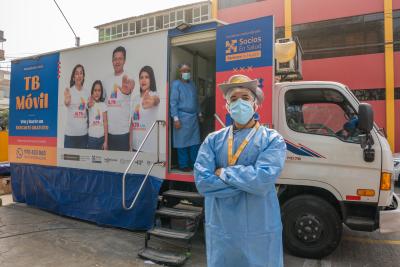
La TB Móvil forma parte de una de las estrategias del Programa de TB, de Socios en Salud, para la detección oportuna de tuberculosis en distintas zonas de Lima.
HIV and Sexually Transmitted Infections (STI)
Along with the U.S. Center for Disease Control and Prevention and the International Organization for Migration, the HIV and Sexually Transmitted Infections (STIs) program conducted a survey to provide estimates of HIV and syphilis prevalence. Thus, it was found that the prevalence of HIV and syphilis in the migrant population was higher than that reported in the Peruvian adult population (18 to 49 years). This is essential data for planning, implementation and access to health services.
In addition, the program provided treatment to 173 people identified with HIV, while 120 started, restarted or continued their antiretroviral therapy. As part of the TB/HIV Country Project 2022-2025, it conducted 91,688 HIV screenings.
Between July 2022 and March 2023, the HIV and STI Program also screened 407 transgender women for timely and free HIV screening, while 443 for TB, through urban mobile brigades and campaigns in trans women’s homes and entertainment venues throughout Metropolitan Lima. A total of 43 of them received nutritional support, housing, document procedures, among others, through the Social Protection Program (PPS).
Non-Communicable Disease Program
In this fiscal year, the Non-Communicable Disease (NCD) Program ensured that 1,496 people with a diagnosis and work plan received medical care; 957 received medication for treatment; 701 received counseling or health education sessions for the prevention and/or care of breast cancer.
As part of its active search work, and through a community intervention, the program screened 701 women, and performed 645 mammograms and 341 ultrasounds for breast cancer detection.
Cervical cancer screening was also one of the key tasks: 2,144 women were educated and oriented about this disease, while 1,460 were connected to health centers for HPV molecular testing.
